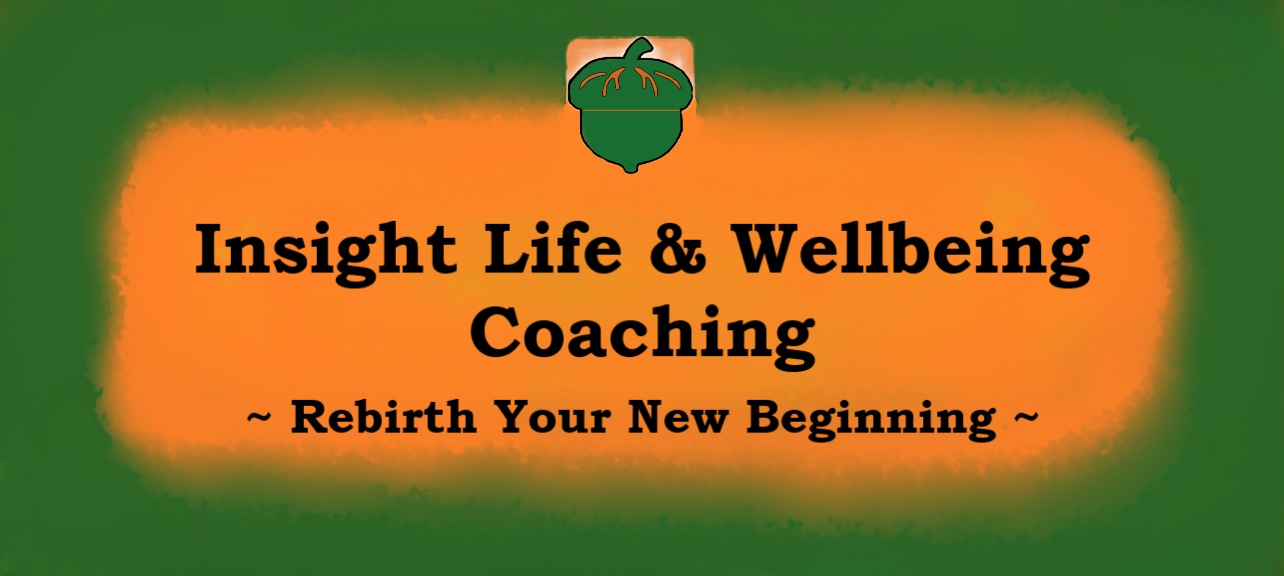
INSIGHT ~ Life & Wellbeing Coaching
*
INSIGHT ~ Life & Wellbeing Coaching *
~ Rebirth Your New Beginning ~

Insight ~ Life & Well-being Coaching will help you identify your goals and develop strategies to achieve them. Insight Life & Well-being Coaches can help you boost your self-confidence and self-awareness, build healthier and more reliable decision-making abilities, find new ways to take your determined actions toward key objectives, and help you maximize your potential interpersonally and intrapersonally. Our approach is client-centered, multiculturally sensitive, humanistic, motivational, strength-based, and curious, and we aim to understand how you view aspects of your life.
Life coaches differ from therapists and counselors. We are not qualified to provide treatment for mental health conditions. Coaching emphasizes the present and how to achieve future goals based on normal psychological, social, and contextual factors rather than pathology or diagnosis. While coaching and psychotherapy are distinct, they can be complementary.
We work with Individuals, Couples, and Family Members 18 years old and older on Zoom or scheduled phone calls.
In-person sessions are strictly up to the coach’s discretion

Types of Coaching We Offer

Spirituality or Spiritual Coaching: Spirituality is “an awareness of a being or force that transcends the material aspects of life and gives a deep sense of wholeness or connectedness to the universe.” Spirituality is conceptualized as the core characteristic of healthy people and the source of all other dimensions of wellness. Many people confuse religion with spirituality or being spiritual. Religion only refers to institutional beliefs and behaviors that are a part of the broader concept of spirituality. Simply put, religion is a public matter, often expressed in group religious participation, whereas spirituality is a private issue that may or may not be expressed publicly. Spiritual wellness is connecting to your inner and outer world to support you in living your values and purpose. Positive signs of spiritual wellness include developing a purpose in life, having the ability to spend reflective time alone, taking time to reflect on the meaning of events in life, having a clear sense of right and wrong, and acting accordingly, having the ability to explain why you believe what you believe, caring and acting for the welfare of others and the environment, and being able to practice forgiveness and compassion in life. The basis of spirituality is discovering a sense of meaningfulness in your life and coming to know that you have a purpose to fulfill. Many factors play a part in defining spirituality: religious faith, beliefs, values, ethics, principles, morals, and the goals of what type of person you want to be. Some gain spirituality by growing in their relationships with others, or through being at peace with nature. Spirituality allows us to find the inner calm and peace needed to get through whatever life brings, no matter what one's beliefs are or where they may be on their spiritual journey. The human spirit is often the most neglected aspect of ourselves. Just as we exercise to condition our bodies, a healthy spirit is nurtured by purposeful practice. The spirit is the aspect of ourselves that can carry us through anything. If we take care of our spirit, we can experience a sense of peace and purpose even when life deals us a severe blow. A strong spirit helps us to develop resilience, survive, and thrive with grace, even in the face of great difficulty. Common Activities for Developing and Practicing Personal Spirituality include Yoga, Mandalas, Labyrinths, and Meditation. Meditation is an experience of relaxing the body, quieting the mind, and awakening the spirit. Meditation encourages a deepening of consciousness or awareness and facilitates a deeper understanding of self and others.
Relational Coaching: Love, Friendship, Relationship, and Intimacy Coaching. Empathy, cooperation, and altruism are all manifestations of social interest. A person's basic social needs are met through interaction with others, which helps us with both physical and emotional health and provides a buffer against stress. The friendship incorporates all of one's social relationships that involve connections with others, preferably individually and in the community. Social contact is as much of human nature, noting that we are all born with the capacity and the need to be connected. Friendships enhance our self-esteem. Relationships formed based on a sustained, long-term, mutual commitment and involve intimacy constitute the life task of love. Adult intimacy in general has many definitions and connotations. In a more psychological context, “intimacy is the capacity to engage in a supportive, affectionate relationship without losing one’s sense of self. It is also in the context of the ability in a relationship to share each other’s views and feelings without the fear of the relationship ending and allowing a degree of independence without feeling threatened” (Boyd & Bee, 2009, p. 405). Some examples of Relational Coaching involve Marital and Premarital Or Life Partner and Pre-life Partner coaching, Polyamory coaching, LGBTQ plus coaching, Alternative Lifestyles coaching, Separation coaching, Divorce coaching, and Infidelity coaching.
Self-Regulation or Self-Direction Coaching: Self-regulation or Self-direction Coaching is how an individual regulates, disciplines, and directs the self in daily activities and pursuit of long-range goals. It refers to a sense of mindfulness and intentionality in meeting the major tasks of life. The patterns of behavior and methods of adjustment to life that make self-direction are sometimes referred to as “positive personality traits” that give one a stress-resistant personality. The life task of self-regulation or self-direction is divided into 12 subtasks: the sense of worth, the sense of control, having realistic beliefs, possessing the skills of emotional awareness and coping, the ability to solve problems and creativity, having a sense of humor, gender identity, sexual identity and health, cultural identity, and understanding and practicing good nutrition, exercise, self-care, and stress management. Some examples of coaching goals for Self-Regulation and Self-Direction Coaching are for Body Positivity, Sex Positivity, Coping Skills, Managing Cognitive Distortions, Improving Self-Esteem, Grief and Bereavement Management, Breaking a Bad Habit or Change in Behavior, Women’s Empowerment Coaching, Men’s Empowerment Coaching, Toxic Masculinity, and Toxic Femininity.
Trauma Coaching: Trauma Coaching is a specialized form of coaching that focuses on helping individuals who have experienced trauma move forward by building resilience and achieving personal goals. Trauma-informed coaching is a way of understanding the presence of past trauma, its current effects on a client, and how to use the client's resiliency to guide them along their path toward solution-focused growth. It differs from therapy by focusing on the present and future, providing practical tools and strategies to manage symptoms and build a more positive life. Trauma-informed coaching integrates an understanding of trauma's impact into the coaching process, creating a safe and supportive environment for clients.

Upcoming Events
Stay Tuned For All Upcoming Workshops, Seminars, and Groups

COMMING UP! SUNDAY, AUGUST 10TH, 2025 AT 3:00 PM CST Group Meditation with Coach Jennifer ~ 45 minutes @ $25.00 per person for up to 10 people. Beginners Level to Advanced, Guided Meditation for Stress Relief.




